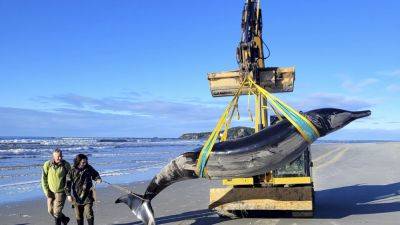World’s rarest whale may have washed up in New Zealand, possibly shedding clues on species
Spade-toothed whales are the world’s rarest, with no live sightings ever recorded. No one knows how many there are, what they eat, or even where they live in the vast expanse of the southern Pacific Ocean. However, scientists in New Zealand may have finally caught a break.
The country’s conservation agency said on Monday a creature that washed up on a South Island beach this month is believed to be a spade-toothed whale. The five-metre-long creature, a type of beaked whale, was identified after it washed ashore on an Otago beach from its colour patterns and the shape of its skull, beak and teeth.
“We know very little, practically nothing” about the creatures, Hannah Hendriks, marine technical adviser for the Department of Conservation, said. “This is going to lead to some amazing science and world-first information.”
If the cetacean is confirmed to be the elusive spade-toothed whale, it would be the first specimen found in a state that would permit scientists to dissect it, allowing them to map the relationship of the whale to the few others of the species found, learn what it eats and perhaps lead to clues about where they live.
This time, the beached whale was quickly transported to cold storage and researchers will work with local Māori iwi [tribes]to plan how it will be examined, the conservation agency said.
New Zealand’s Indigenous people consider whales a taonga – a sacred treasure – of cultural significance. In April, Pacific Indigenous leaders signed a treaty recognising whales as “legal persons”, although such a declaration is not reflected in the laws of nations taking part.
Nothing is currently known about the whales’ habitat. The creatures deep-dive for food and probably surface so rarely that it has been







